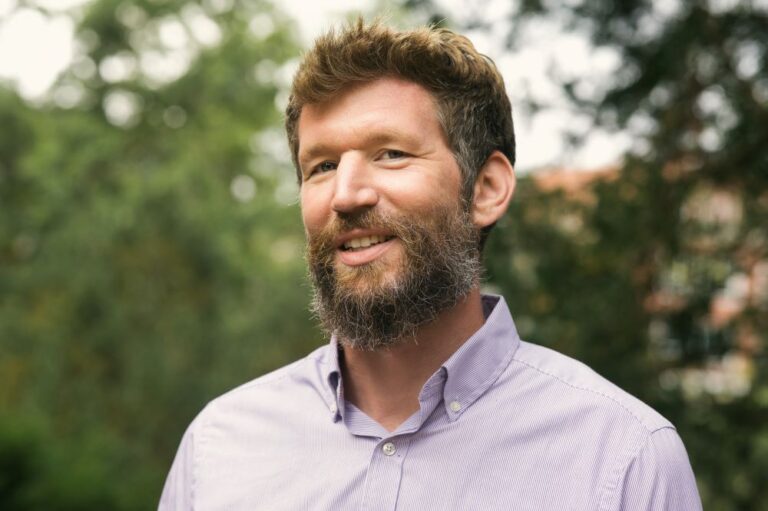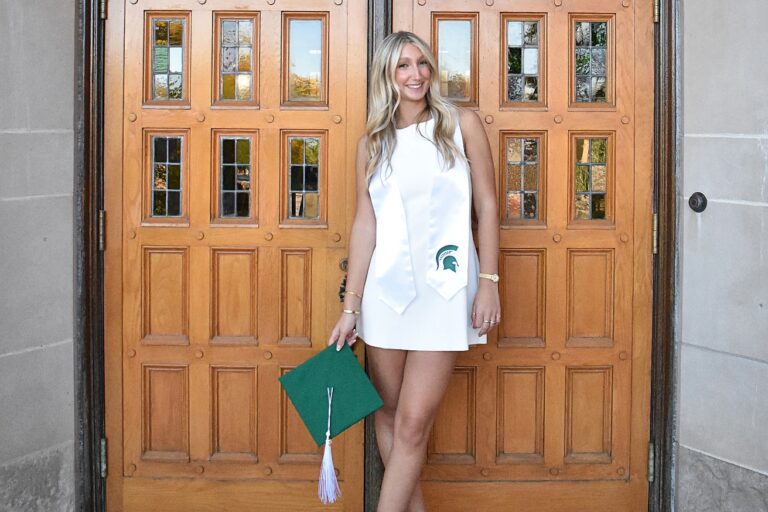In only its second year, the Making Learning Accessible Conference hosted at Michigan State University has doubled in size and expanded its scope.
The conference, held December 2 at MSU’s Kellogg Hotel & Conference Center, celebrates and explores accessibility with the goal of providing a broad range of information and ideas to help participants design universally accessible courses, websites and content.

“It’s just a phenomenal opportunity for people to come together to talk and think about accessibility and what we can do as instructors and curriculum developers to make our materials more accessible to students regardless of whether they have a disability or not,” said Kate Sonka, Academic Specialist in Integrative Arts & Humanities and Education Technology for MSU’s College of Arts & Letters, who organized the event. “If you do some of these changes for what some see as the ‘margins of society,’ they actually benefit everybody.”
Attendance Increases
Last year’s conference, held at the MSU Union, had 80 people attend. This year, there were 160 registrants with a wait list of about 20 people.
“MSU is the largest contingency, but it is spread across so many units on campus, and we have started attracting partners from other universities like the University of Michigan, Wayne State and Lansing Community College,” Sonka said. “We also have some nonprofits, and probably the most surprising thing this year is how many state of Michigan employees attended from all different departments including Treasury, Education, Environmental Quality, and Natural Resources.”

One of the state employees in attendance was George Kobreek, Secretary for the Office of Special Education in the Department of Education.
“We are in the process of converting all of our documents on the web for accessibility, and we want to learn as much as possible and find out other processes that are in place,” Kobreek said. “When I looked at MSU’s website, I saw that they have some really good practices in place so I wanted to attend this conference to see if there is anything we can learn.”
You might think that it is a small sliver on the pie chart that uses these features but really everyone can take advantage of it.
GEORGE KOBREEK
Kobreek, who is helping to convert the Office of Special Education documents for accessibility, has found himself starting to use some of the accessibility features, like watching a video with the volume turned down and the closed caption on or having a document read to him.
“You might think that it is a small sliver on the pie chart that uses these features but really everyone can take advantage of it,” he said, “and you never know what could happen in the future where you might need to use this stuff.”
Some people from outside of Michigan also traveled to the Making Learning Accessible Conference, including Kristi O’Neil-Gonzalez, Instructional Designer for California State University Channel Islands.
“It’s very exciting to be in a room with this many people who care enough to show up and who have varying degrees and levels of understanding and knowledge for accessibility,” said O’Neil-Gonzalez, who heads up the accessibility efforts at CSU Channel Islands. “I don’t know if we will ever have the budget or space to do the kinds of things that are done here, but I am super excited to be part of this. For me, MSU is up there along with the University of Washington as a great resource to tap into.”
Presentations and Sponsorships Grow
The Making Learning Accessible Conference not only doubled in size, it also tripled the space this year, having the capacity for more presentations as well as adding a poster session, test kitchen and demos to the schedule. Included in the presentations were several from Michigan State University and College of Arts & Letters students.
“There was a balance of students, faculty and staff talking on different topics,” said Sonka, who assembled a larger planning committee for the 2016 conference. “The proposal review committee had a hard time trying to decide who could present this year because we had more submissions than space. Also there was a lot of interest in the test kitchen and demos on assistive technology.”
The fact that people around campus care to provide the funding so we can make it free is tremendous, and I am very grateful for all those individuals and units who supported the conference.
KATE SONKA
As the conference has grown, so too have the partners on campus willing to sponsor the event.
“It is majorly supported by the College of Arts & Letters, but we have really great partnerships with the College of Natural Science, College of Agriculture, the MSU Libraries, IT Services, the Resource Center for Persons with Disabilities, Office for Inclusion and Intercultural Initiatives, and the Associate Provost for Undergraduate Education. Usability/Accessibility Research and Consulting also helped us secure the space at the Kellogg Center,” Sonka said. “Through these sponsors, we’ve been offering this as a free event these past two years and I think that is really congruent to the spirit of the topic. The fact that people around campus care to provide the funding so we can make it free is tremendous, and I am very grateful for all those individuals and units who supported the conference.”
Student Participation a Driving Force
Plans for next year’s conference already are underway, and based on the response from the past two years, Sonka said she knows it will continue to grow with the 2017 conference being expanded to two days – Friday, December 1, and Saturday, December 2, at the Kellogg Hotel and Conference Center.
Student participation also will continue to be an important part of the conference.
“Everybody’s voice should be heard and that is especially true at a university,” Sonka said. “Creating a space where we’re saying to students that we don’t have the answers either (there’s a lot of work to be done in the field of accessibility) and you’re a part of this, is so important. We are trying to break down that perceived barrier of ‘I’m just a student, and these people are professionals or professors,’ Everyone can contribute in some way.”
In fact, the original idea for the conference came from then undergraduate student Phil Deaton, who graduated in 2015 with a double major in Professional Writing and English and who now is the Web Accessibility Specialist for Michigan State University and is working on his master’s degree in Digital Rhetoric and Professional Writing.

“Without Phil’s idea, who was a student at the time, maybe this wouldn’t have happened or it would have looked different and we would be missing out on the student component,” Sonka said. “That first year, it exceeded our expectations and all the feedback we received was really positive. I knew it was something that had to happen again.
“There are so many people around campus who are doing work on accessibility who come together in different ways, but there isn’t a time where we are all together in one space. Maybe there are new partnerships or collaborations that come out of it, or opportunities that otherwise would not have happened. I am beyond pleased that it has taken off in the way that it has these past two years.”
Written by Alexandria Drzazgowski, Professional Writing Major


